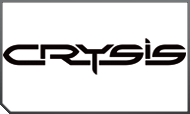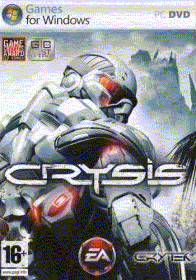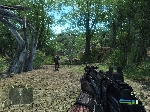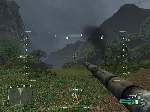
|
Genre |
FPS |
 |
|
System |
P4 2.8GHz, 1GB, 256MB card |
|
|
Year |
2008 |
|
| Developer |  |
CRYSIS
Crytek's Far Cry came pretty much
out of nowhere back in 2004 and impressed just about everyone, press
and players alike, with its ground breaking graphics and truly open
gameplay. Only the heavyweight Half-life 2 prevented it from sweeping
the board of that year's prizes.
Four years later out comes
its successor, Crysis. Rather more anticipated than Far Cry, it was
awaited anxiously by all, with its quite extraordinary visuals being
trailed constantly.
THE GAME
You play a member of a small Special Forces unit dropped onto a Pacific island to investigate the disappearance of a scientific expedition. The reason you are going, rather than a simple search and rescue outfit, is that the North Koreans are interested enough in what's going on to have invaded the island.
 a
vantage point from which to pick off the enemy you spotted during your
reconnaissance. Another option is to create some mayhem on one side
of the camp, select stealth and bimble across to the quiet bit to carry
out whatever task you were given. Bear in mind always that although
you may be invisible, you remain audible, which can be enough for the
enemy to bring lethal fire to bear.
a
vantage point from which to pick off the enemy you spotted during your
reconnaissance. Another option is to create some mayhem on one side
of the camp, select stealth and bimble across to the quiet bit to carry
out whatever task you were given. Bear in mind always that although
you may be invisible, you remain audible, which can be enough for the
enemy to bring lethal fire to bear.
So, how is this different from
Far Cry and all the rest of the FPS out there? Well, aside from the
sheer technical exuberance of the graphics and enemy AI, there's the
nanosuit. Which is quite special.
SMALL THINGS
The nanosuit is the thing that
gives you the edge. It has four modes, two of which you will be using
roughly 90% of the time.
Next is stealth mode. This renders
you completely invisible to both humans and aliens. At rest, the mode
uses relatively little energy, so you can sit and watch the enemy for
ages, working out his routines and identifying the best way in and out
of the next objective. However, should you move,
the energy drains very quickly, so once again you have to find cover
and recharge without being seen. It only takes about five seconds to
reach full power, but if the bad guys are on your arse, even that's
too long, so you have to pick your path with care. The second restriction
is that should you fire a weapon while cloaked, you instantly drain
your power supply and become visible (as well as vulnerable) to all
and sundry.
Mode three is all about speed.
With this selected your normal walking pace is roughly doubled and you
are able to sprint for about 100 yards at a fiendish pace. This is great
for dashing across open spaces or away from a fire fight and you can
use it to get to objectives more quickly, except that you may well stumble
across a Korean patrol without warning.
The final and least used mode is
strength. Mostly you use this to jump higher than you would normally
be able, both up and down. However, you can also use it more imaginatively.
You can pick up almost anything that should be moveable and with strength
selected, you can then throw it considerable distances or with great
force. Thus you can use barrels and boxes as weapons. In fact, if you
grab a Korean with your hands (an option that becomes available once
you get close enough), you can either throw him around a quarter of
a mile or use him as a weapon!
Strength also allows you to punch holes in walls, shift boats and trucks
and punch out any baddies that get in your way.
If you use the suit intelligently
and only initiate contact once you have the advantage, you can go long
periods without dying. You can also try the full stealth option and
attempt to achieve all your tasks with the minimum of force, though
this would deny you the use of some great weapons and mean that you
wouldn't get to marvel at the enemy's AI.
HARDWARE
The Far Cry binoculars make a welcome
return. As well as having a directional and extremely sensitive microphone,
they have a link to your HUD, meaning that you can lock onto and subsequently
track enemy soldiers and vehicles. This is vital before you head into
an enemy base, particularly if they have fixed defences.
Road vehicles come in four guises.
Most common is the humvee, with a gun midships. Also quite numerous
are plain civilian trucks, while you can also trundle around in heavy
lorries, some of which come armed. Driving
is not quite the pleasure it was in Far Cry and aside from a few instances, you will
probably prefer to stay on foot where you can use the suit to its best
advantage.
pleasure it was in Far Cry and aside from a few instances, you will
probably prefer to stay on foot where you can use the suit to its best
advantage.
As in Far Cry, boats are both common
and necessary. The enemy uses them to patrol near the coast and on rivers
and you can use them to either flank or enfilade prior to hitting the
beach.
There's no hang glider this time,
but you do get to fly both a helicopter and a VTOL,
though it has to be said that the latter sequence is rather weak, with
the thing handling like both a brick and a feather, which ain't easy
to achieve.
Now we come to the area where the
game received the most flak. Computer hardware.
The system demands of the engine are phenomenal. Unless you have the
fastest available dual core chip, with 4GB RAM and top of the range
graphics card, you will be stooging around on low or medium graphics
at best. What's more, the game is optimised for DirectX 10, which comes
with
Having said all that, even on low
settings, it looks better than just about anything else out there at
time of writing (mid-08). There is a sequel / second episode upcoming
and Crytek swear blind that they've improved the engine to the extent
that almost everyone will be able to set at least medium settings without
it turning into a slide show.
AND SO …
Crysis is Far Cry on speed. The
freedom is there, only more so and the enemy AI is mostly spot-on. The
tasks are varied enough to keep you interested in the plot and the kit,
especially the nanosuit, make for excellent gameplay. Graphics I've
already mentioned. However, it is a game of two halves. In the first,
you see the best of Crytek's design, while the second smacks either
of brave experimentation or a sudden loss of nerve. When it comes down
to it, the nanosuit is the trump card in this game and the sequences
when you have to use it imaginatively are the most satisfying.
A mention too
of the "emergent" gameplay.
For the unitiated, this means stuff happening that isn't scripted, but
which comes about via the unplanned convergence of various gameplay
elements. An example would be an instance at the top of a hill where
I was supposed to destroy something or other. I had successfully neutralised
the perimeter guards, attracting the attention of about half a dozen
soldiers who came down the hill in such a way that I didn't have a hope
of engaging them all. I therefore cloaked up and snuck round them.
Using the suit's abilities imaginatively
is also great fun. A fast dash towards a perimeter
fence, followed by a power jump onto a roof inside the compound, cloaking
in mid-air. The enemy know something has happened and some may
even have seen me come over the wall, but by lying low and recharging,
I now have the advantage and can create mayhem at my leisure.
So, the first half of the game
is probably the best FPS ever made. The second half has its moments,
but playing through again I would skip the alien bit and the Carrier
denouement. As for the hardware requirements, I really can't get excited.
Even at low res', it beats the crap out of anything contemporary and
if your rig is so decrepit it can't run it at all, then you know what
you have to do!

